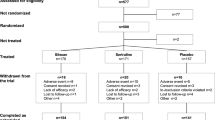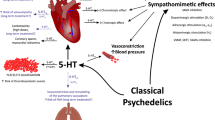Abstract
Introduction
Psychotropic drugs such as anxiolytics, antidepressants and antipsychotics may have anticholinergic properties that could directly affect patients’ cognition.
Objectives
Our objective was to assess the relationship between exposure to anticholinergic-positive (AC+) psychotropic drugs and cognitive impairment compared with psychotropic drugs without anticholinergic activity (AC−).
Methods
This analysis included participants (aged 45–70 years) enrolled between January 2012 and October 2017 in the CONSTANCES cohort treated with psychotropic drugs (antidepressants n = 2602, anxiolytics n = 1195, antipsychotics n = 197) in the 3 years preceding cognitive assessment. Within each drug class, the Anticholinergic Cognitive Burden scale was used to classify drugs as either AC+ or AC−. Cognitive impairment was defined as a score below − 1 standard deviation from the standardized mean of the neuropsychological score. We used multiple logistic regression models and matching on propensity score to estimate the relationship between anticholinergic activity and cognitive impairment.
Results
Our analyses did not show any increased risk of cognitive impairment for AC+ antidepressants and anxiolytics, with the exception of a slight increase for AC+ antidepressants in episodic memory (odds ratio [OR] 1.19; 95% confidence interval [CI] 1.05–1.36). Conversely, we found a more marked increase in risk with AC+ antipsychotics on executive function (Trail Making Test-A [TMT-A], OR 4.49 [95% CI 2.59–7.97] and TMT-B, OR 3.62 [95% CI 2.25–5.89]).
Conclusion
Our results suggest there is no clinically relevant association between the anticholinergic activity of antidepressant and anxiolytic drugs and cognitive impairment in middle-aged adults. An association could exist between AC+ antipsychotics and executive function.

Similar content being viewed by others
References
Campbell NL, Perkins AJ, Bradt P, Perk S, Wielage RC, Boustani MA, et al. Association of anticholinergic burden with cognitive impairment and health care utilization among a diverse ambulatory older adult population. Pharmacotherapy. 2016;36:1123–31.
Montastruc F, Retailleau E, Rousseau V, Bagheri H, Montastruc J-L. Atropinic burden of prescription forms in France: a study in community pharmacies in 2013. Eur J Clin Pharmacol. 2014;70:1147–8.
Richardson K, Fox C, Maidment I, Steel N, Loke YK, Arthur A, et al. Anticholinergic drugs and risk of dementia: case–control study. BMJ. 2018;361:k1315.
Ziad A, Olekhnovitch R, Ruiz F, Berr C, Bégaud B, Goldberg M, et al. Anticholinergic drug use and cognitive performances in middle age: findings from the CONSTANCES cohort. J Neurol Neurosurg Psychiatry. 2018;89:1107–15.
Lagnaoui R, Depont F, Fourrier A, Abouelfath A, Bégaud B, Verdoux H, et al. Patterns and correlates of benzodiazepine use in the French general population. Eur J Clin Pharmacol. 2004;60:523–9.
médicale (Inserm) I national de la santé et de la recherche. Médicaments psychotropes : Consommations et pharmacodépendances [Internet]. Les éditions Inserm; 2012. http://www.ipubli.inserm.fr/handle/10608/2072. Accessed 29 Oct 2018.
Campbell N, Boustani M, Limbil T, Ott C, Fox C, Maidment I, et al. The cognitive impact of anticholinergics: a clinical review. Clin Interv Aging. 2009;4:225–33.
Mura T, Proust-Lima C, Akbaraly T, Amieva H, Tzourio C, Chevassus H, et al. Chronic use of benzodiazepines and latent cognitive decline in the elderly: results from the three-city study. Eur Neuropsychopharmacol J Eur Coll Neuropsychopharmacol. 2013;23:212–23.
Trivedi MH, Greer TL. Cognitive dysfunction in unipolar depression: implications for treatment. J Affect Disord. 2014;152:19–27.
Hori H, Noguchi H, Hashimoto R, Nakabayashi T, Omori M, Takahashi S, et al. Antipsychotic medication and cognitive function in schizophrenia. Schizophr Res. 2006;86:138–46.
Vulser H, Wiernik E, Hoertel N, et al. Depression, cognitive functions, and impaired functioning in middle-aged adults from the CONSTANCES cohort. JClin. Psychiatry. 2018;79(6):17m12003.
Kaup AR, Byers AL, Falvey C, Simonsick EM, Satterfield S, Ayonayon HN, et al. Trajectories of depressive symptoms in older adults and risk of dementia. JAMA Psychiatry. 2016;73:525–31.
Greenblatt HK, Greenblatt DJ. Use of antipsychotics for the treatment of behavioral symptoms of dementia. J Clin Pharmacol. 2016;56:1048–57.
Ruiz F, Goldberg M, Lemonnier S, Ozguler A, Boos E, Brigand A, et al. High quality standards for a large-scale prospective population-based observational cohort: constances. BMC Public Health. 2016;16:877.
Zins M, Goldberg M, CONSTANCES Team. The French CONSTANCES population-based cohort: design, inclusion and follow-up. Eur J Epidemiol. 2015;30:1317–28.
Bilan de santé et questionnaires | L’espace scientifique | Cohorte Constances [Internet]. [cited 2020 Dec 12]. https://www.constances.fr/questionnaires.php. Accessed 20 June 2019.
Bezin J, Duong M, Lassalle R, Droz C, Pariente A, Blin P, et al. The national healthcare system claims databases in France, SNIIRAM and EGB: powerful tools for pharmacoepidemiology. Pharmacoepidemiol Drug Saf. 2017;26:954–62.
Campbell NL, Maidment I, Fox C, Khan B, Boustani M. The 2012 update to the anticholinergic cognitive burden scale. J Am Geriatr Soc [Internet]. Wiley-Blackwell; 2013. p. S142–3. https://www.research.aston.ac.uk/en/publications/the-2012-update-to-the-anticholinergic-cognitive-burden-scale. Accessed 05 Oct 2020.
Gray SL, Anderson ML, Dublin S, Hanlon JT, Hubbard R, Walker R, et al. Cumulative use of strong anticholinergics and incident dementia: a prospective cohort study. JAMA Intern Med. 2015;175:401–7.
WHOCC - ATC/DDD Index [Internet]. https://www.whocc.no/atc_ddd_index/. Accessed 19 Sept 2019.
Grober E, Buschke H, Crystal H, Bang S, Dresner R. Screening for dementia by memory testing. Neurology. 1988;38:900–3.
Borkowski JG, Benton AL, Spreen O. Word fluency and brain damage. Neuropsychologia. 1967;5:135–40.
Cardebat D, Doyon B, Puel M, Goulet P, Joanette Y. Formal and semantic lexical evocation in normal subjects. Performance and dynamics of production as a function of sex, age and educational level. Acta Neurol Belg. 1990;90:207–17.
Wechsler D. WAIS-R, Wechsler Adult Intelligence Scale- Revised, Manual. New York, NY: Psychological Corporation; 1981.
The Fundamentals of Clinical Neuropsychiatry [Internet]. https://www.global.oup.com/academic/product/the-fundamentals-of-clinical-neuropsychiatry-9780195130379.
Boll TJ, Reitan RM. Effect of age on performance of the Trail Making Test. Percept Mot Skills. 1973;36:691–4.
Miner T, Ferraro FR. The role of speed of processing, inhibitory mechanisms, and presentation order in trail-making test performance. Brain Cogn. 1998;38:246–53.
Dion M, Potvin O, Belleville S, Ferland G, Renaud M, Bherer L, et al. Normative data for the Rappel libre/Rappel indicé à 16 items (16-item Free and Cued Recall) in the elderly Quebec-French population. Clin Neuropsychol. 2015;28(Suppl 1):S1-19.
Busse A, Hensel A, Gühne U, Angermeyer MC, Riedel-Heller SG. Mild cognitive impairment: long-term course of four clinical subtypes. Neurology. 2006;67:2176–85.
Morin AJS, Moullec G, Maïano C, Layet L, Just J-L, Ninot G. Psychometric properties of the Center for Epidemiologic Studies Depression Scale (CES-D) in French clinical and nonclinical adults. Rev Epidemiol Sante Publique. 2011;59:327–40.
Tammenmaa-Aho I, Asher R, Soares-Weiser K, Bergman H. Cholinergic medication for antipsychotic-induced tardive dyskinesia. Cochrane Schizophrenia Group, editor. Cochrane Database Syst Rev [Internet]. 2018. https://doi.org/10.1002/14651858.CD000207.pub2
Rosenbaum PR, Rubin DB. The central role of the propensity score in observational studies for causal effects. 1983. https://dash.harvard.edu/handle/1/3382855. Accessed 03 July 2018.
Mitra R, Reiter JP. A comparison of two methods of estimating propensity scores after multiple imputation. Stat Methods Med Res. 2016;25:188–204.
Pasina L, Colzani L, Cortesi L, Tettamanti M, Zambon A, Nobili A, et al. Relation between delirium and anticholinergic drug burden in a cohort of hospitalized older patients: an observational study. Drugs Aging. 2019;36:85–91.
Mori K, Yamashita H, Nagao M, Horiguchi J, Yamawaki S. Effects of anticholinergic drug withdrawal on memory, regional cerebral blood flow and extrapyramidal side effects in schizophrenic patients. Pharmacopsychiatry. 2002;35:6–11.
Rémillard S, Pourcher E, Cohen H. Long-term effects of risperidone versus haloperidol on verbal memory, attention, and symptomatology in schizophrenia. J Int Neuropsychol Soc. 2008;14:110–8.
Rudolph JL, Salow MJ, Angelini MC, McGlinchey RE. The anticholinergic risk scale and anticholinergic adverse effects in older persons. Arch Intern Med. 2008;168:508–13.
Carnahan RM, Lund BC, Perry PJ, Pollock BG, Culp KR. The Anticholinergic Drug Scale as a measure of drug-related anticholinergic burden: associations with serum anticholinergic activity. J Clin Pharmacol. 2006;46:1481–6.
Mebarki S, Trivalle C. Évaluation de la charge anticholinergique en gériatrie à l’aide de 3 échelles. NPG Neurol - Psychiatr - Gériatrie. 2014;14:81–7.
Acknowledgements
The authors thank the National Health Insurance Fund (‘Caisse Nationale d’Assurance Maladie’ [CNAM] and its health screening centres (‘Centres d’examens de santé’), where a large part of the data was collected, and ClinSearch, which was in charge of the data quality control.
Author information
Authors and Affiliations
Corresponding author
Ethics declarations
Funding
The CONSTANCES Cohort Study is supported by the Caisse nationale d’assurance maladie (CNAM), benefits from a grant from ANR (ANR-11-INBS-0002) and is partly funded by MSD, AstraZeneca and Lundbeck.
Conflicts of interest
Abdelkrim Ziad, Claudine Berr, Fabrice Ruiz, Bernard Bégaud, Cédric Lemogne, Marcel Goldberg, Marie Zins, Thibault Mura have no conflicts of interest that are directly relevant to the content of this article.
Ethics approval
The study protocol was approved by the appropriate ethics committee. According to French regulations, the CONSTANCES cohort was approved by the Data Protection Authority (Commission Nationale de l’Informatique et des Libertés) and by the INSERM institutional review board.
Consent to participate
All participants signed a written informed consent before inclusion in the present study.
Consent for publication
Not applicable.
Code availability
Not applicable
Availability of data and material
The data that support the findings of this study are available on request from the corresponding author. The data are not publicly available because they contain information that could compromise the privacy of the study participants.
Authors’ contributions
AZ and TM co-managed the literature searches and undertook the statistical analysis. AZ wrote the first draft of the manuscript. TM, BB and CL made substantial modifications to the manuscript and approved the final version. CB and FR co-managed the literature searches, made substantial modifications to the manuscript and approved the final version. MZ and MG co-designed the cohort study CONSTANCES and wrote the protocol, made substantial modifications to the manuscript and approved the final version. All authors read and approved the manuscript.
Supplementary Information
Below is the link to the electronic supplementary material.
Rights and permissions
About this article
Cite this article
Ziad, A., Berr, C., Ruiz, F. et al. Anticholinergic Activity of Psychotropic Drugs and Cognitive Impairment Among Participants Aged 45 and Over: The CONSTANCES Study. Drug Saf 44, 565–579 (2021). https://doi.org/10.1007/s40264-021-01043-5
Accepted:
Published:
Issue Date:
DOI: https://doi.org/10.1007/s40264-021-01043-5




